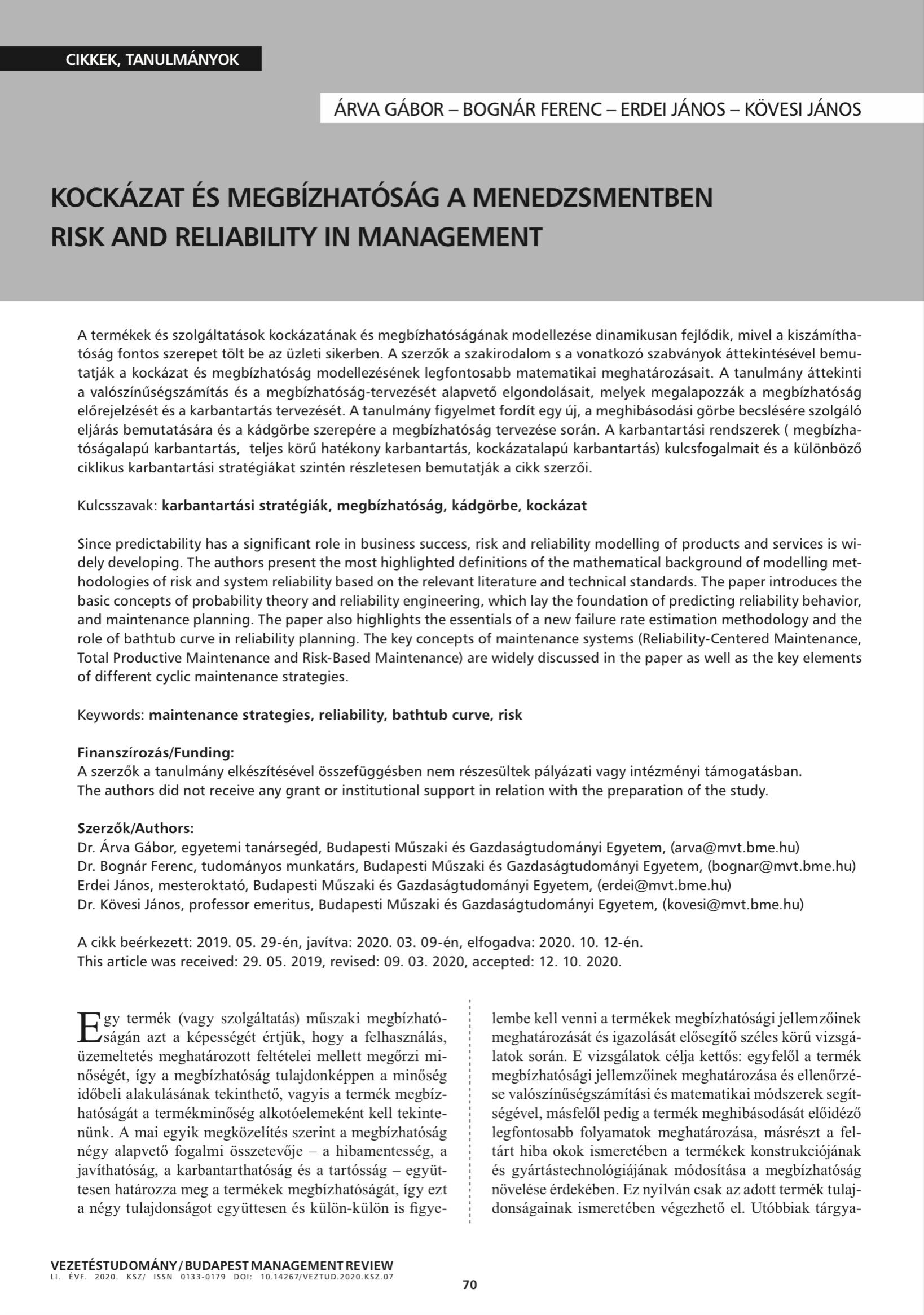Kockázat és megbízhatóság a menedzsmentben
DOI:
https://doi.org/10.14267/VEZTUD.2020.KSZ.07Kulcsszavak:
karbantartási stratégiák, megbízhatóság, kádgörbe, kockázatAbsztrakt
A termékek és szolgáltatások kockázatának és megbízhatóságának modellezése dinamikusan fejlődik, mivel a kiszámíthatóság fontos szerepet tölt be az üzleti sikerben. A szerzők a szakirodalom s a vonatkozó szabványok áttekintésével bemutatják a kockázat és megbízhatóság modellezésének legfontosabb matematikai meghatározásait. A tanulmány áttekinti a valószínűségszámítás és a megbízhatóság-tervezését alapvető elgondolásait, melyek megalapozzák a megbízhatóság előrejelzését és a karbantartás tervezését. A tanulmány figyelmet fordít egy új, a meghibásodási görbe becslésére szolgáló eljárás bemutatására és a kádgörbe szerepére a megbízhatóság tervezése során. A karbantartási rendszerek ( megbízhatóságalapú karbantartás, teljes körű hatékony karbantartás, kockázatalapú karbantartás) kulcsfogalmait és a különböző ciklikus karbantartási stratégiákat szintén részletesen bemutatják a cikk szerzői.
Letöltések
Hivatkozások
Almalki, S. J., & Nadarajah, S. (2014). Modifications of the Weibull distribution: A review. Reliability Engineering & System Safety, 124, 32 –55. https://doi.org/10.1016/j.ress.2013.11.010
Árva, G., & Tamás J. (2017). A Soft Computational Approach to Long Term Forecasting of Failure Rate Curves. In Rojas, I., Pomares, H., & Valenzuela, O. (eds.), Advances in Time Series Analysis and Forecasting, ITISE 2016 Contributions to Statistics (pp. 329-342). Cham: Springer. https://doi.org/10.1007/978-3-319-55789-2_23
Balogh, A., Dukáti, L., & Sallay, L. (1980). Minőség-ellenőrzés és megbízhatóság. Budapest: Műszaki Könyvkiadó. Bazaara, M. S., Sherall, H. D., & Shetty, C. M. (2006). Nonlinear Programming: Theory and Algorithmus. New Jersey: Wiley.
Bognár, F. (2019). Karbantartási stratégiák és rendszerek. In Bognár F. (ed.), Karbantartás-menedzsment (pp.) Veszprém: Veszprémi Egyetemi Kiadó.
Bognár, F., & Gáspár, M. (2012). A döntésorientált hibamód és hatáselemzés (DOFMEA) kifejlesztése és alkalmazása. In Balogh, Á. (eds.), Karbantartás a hatékonyság és a fenntarthatóság szolgálatában ( pp. 189-216). Veszprém: Veszprémi Egyetemi Kiadó.
Byrd, R. H., Hribar, M. E., & Nocedal, J. (1999). An interior point algorithm for large-scale nonlinear programming. SIAM Journal on Optimization, 9(4), 877-900. https://doi.org/10.1137/S1052623497325107
Chen, T. Y., Lin, W. T., & Sheu, C. (2018). A dynamic failure rate forecasting model for service parts inventory. Sustainability, 10(7), 2408. https://doi.org/10.3390/su10072408
Csendes, T. (1988). Nonlinear Parameter Estimation by GLOBAL optimization – Efficiency and Reliability. Acta Cybernet, 8(4), 361-372.
Csendes, T., Pál, L., Sendin, J. O. H., & Banga, J. R. (2008). The GLOBAL optimization method revisited. Optimization Letters, 2(4), 445-454. https://doi.org/10.1007/s11590-007-0072-3
Dombi, J. (2012a). Modalities. Advances in Intelligent and Soft Computing, 107(1), 53-65. https://doi.org/10.1007/978-3-642-24001-0_7
Dombi, J. (2012b). On a certain type of unary operators. In Proceedings of 2012 IEEE International Conference on Fuzzy Systems, Brisbane QLD (pp. 1-7). 10-15. June, 2012. https://doi.org/10.1109/FUZZ-IEEE.2012.6251349
Dombi, J., Jónás, T., Tóth, Zs. E., & Árva, G. (2019). The omega probability distribution and its applications in reliability theory. Quality and Reliability Engineering International, 35(2), 600-626. https://doi.org/10.1002/qre.2425
Erdei, J., Kövesi, J., Topár, J., & Tóth, Zs. E. (2006). Minőség és Megbízhatóság. In Kövesi, J., & Topár, J. (eds.), A minőségmenedzsment alapjai (pp. ). Budapest: Typotex Kiadó.
Erdei, J., Jónás, T., Kövesi, J., & Tóth, Zs. E. (2011). Megbízhatóság és karbantartás. In Kövesi, J. (eds.), Minőség és megbízhatóság a menedzsmentben (pp. ). Budapest: Typotex Kiadó.
Gaál, Z. (2007). Karbantartás-menedzsment. Veszprém: Pannon Egyetemi Kiadó.
Gaál, Z., & Kovács, Z. (1994). Megbízhatóság, karbantartás. Veszprém: Veszprémi Egyetem Kiadói Iroda. Gnyegyenko, B. V., Beljajev, J. K., & Szolovjev, A. D. (1970). A megbízhatóságelmélet matematikai módszerei. Budapest: Műszaki Könyvkiadó.
Kasper, H., & Lemmink, J. (1989). After Sales Service Quality: Views between industrial customers and service Managers. Industrial Marketing Management, 18(3), 199-208. https://doi.org/10.1016/0019-8501(89)90036-9
Kövesi, J. (ed.) (1991). Termelőberendezések megbízhatóságalapú karbantartása. Budapest: BME Mérnöktovábbképző Intézet.
Kövesi, J., Erdei, J., & Bognár, F. (2018). Kockázat és megbízhatóság (Egyetemi jegyzet). Budapest: Budapesti Műszaki és Gazdaságtudományi Egyetem.
Lee, S. W., & Lee, H. K. (2008). Reliability prediction system based on the failure rate models of electronics components. Journal of Mechanical Science and Technology, 22(5), 957-964. https://doi.org/10.1007/s12206-008-0212-4
Moubray, J. (1997). Reliability-Centered Maintenance. Oxford: Butterworth-Heinmann.
MSZ IEC 50 (191) (1992). Nemzetközi elektronikai szótár. Megbízhatóság és a szolgáltatás minősége.
Nakajima, S. (1989). TPM Development Program. Cambridge, Mass.: Productivity Press.
O’Connor P. D. T. (2006). Practical Reliability Engineering. Chichester: JohnWiley & Sons Ltd.
Okorie., I. E., & Nadarajah, S. (2019). On the Omega Probability Distribution. Quality and Reliability Engineering International, 2019, 1-6. https://doi.org/10.1002/qre.2462
Papp, L. (ed.) (1998). A minőségmenedzsment alapjai. Budapest: Műegyetemi Kiadó.
Péczely, Gy. (2003). RCM – Reliability-Centered Maintenance – Megbízhatóság Központú Karbantartás. In Gaál, Z. (ed.), Tudásbázisú karbantartás (pp. 63-97). Veszprém: Veszprémi Egyetemi Kiadó.
Pujadas, W., & Chen, F. F. (1996). A Reliability Centered Maintenance Strategy for a Discrete Part Manufacturing Facility. Computers & Industrial Engineering, 31(1-2), 241-244. https://doi.org/10.1016/0360-8352(96)00121-0
Rinne, H. (2008). The Weibull Distribution: A Handbook. Boca Raton: CRC Press.
Sakai, S. (2010). Risk-based Maintenance. East Technical Review, 17, 1-4.
Suzuki, T. (1992). New Directions for TPM. Cambridge, Mass.: Productivity Press.
Szabó, B. (1976). Karbantartási kézikönyv. Budapest: Műszaki Könyvkiadó.
Szántó, J. (2008). Karbantartási stratégiák. In Dömötör, F. (ed.), Rezgésdiagnosztika, I. kötet (pp. 1-23), Dunaújváros: Dunaújvárosi Főiskola Kiadói Hivatal.
Zhang, T., & Dwight, R. (2013). Choosing an Optimal Model for Failure Data Analysis by Graphical Approach. Reliability Engineering and System Safety, 115, 111-123. http://dx.doi.org/10.1016/j.ress.2013.02.004

Downloads
Megjelent
Hogyan kell idézni
Folyóirat szám
Rovat
License
Authors assign copyright to Vezetéstudomány / Budapest Management Review. Authors are responsible for permission to reproduce copyright material from other sources.

